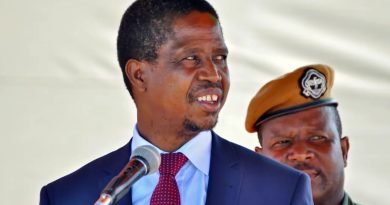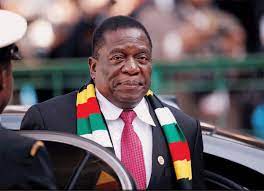Mbare traders seek Chiwenga’s help in simmering rental woes at new site
HARARE – Frustration is simmering at Harare’s largest informal market, Mbare Musika, as traders claim they are being subjected to “extortionist fees” at the newly constructed facility. In a move that has laid bare underlying factionalism within Zanu PF, the traders have sought the intervention of Vice-President Constantino Chiwenga to resolve their grievances.
The traders, in a letter dated August 18, detailed a litany of challenges they are facing at the market, which they attribute to its privatisation by individuals seeking personal gain. Their complaints include exorbitant charges, the exclusion of original beneficiaries, reduced space sizes for market stalls, and the refusal to accept rental fees in local currency.
“Knowing your warm heart, we are looking forward to your usual assistance,” the letter read, directly appealing to Chiwenga for his intervention. The letter was signed by Roderick Maposah, the Mbare retail market chairman, Josiah Rovai, the secretary, and Stephen Tsopo, a security officer. Copies were also sent to Local Government minister Daniel Garwe, Harare Provincial Affairs minister Charles Tawengwa, and Harare mayor Jacob Mafume.
However, sources indicate that Garwe reacted with displeasure to the traders’ decision to bypass his ministry and directly approach Chiwenga. Garwe is reportedly a key figure in Zanu PF’s 2030 agenda, a campaign aimed at extending President Emmerson Mnangagwa’s rule beyond his constitutionally mandated terms. This agenda is seen by some as a strategy to thwart Chiwenga’s potential ascendancy to the presidency.
The traders’ woes began after Mnangagwa declared the market a state of disaster following a fire in October last year. The president subsequently launched the “Building Back Better” reconstruction plan, awarding a contract to Masimba Holdings, a company allegedly linked to a Zanu PF benefactor, under controversial circumstances.
Garwe’s ministry, which signed the memorandum of understanding with Masimba, has faced criticism for selecting the contractor without a clear and transparent process. Approximately 4,695 traders affected by the fire had been operating from temporary facilities, anticipating a return to their original workplaces upon completion of the new market.
However, according to the traders’ letter, only a small fraction of the original beneficiaries have been able to secure stalls in the new market, with nearly 70% allegedly sidelined by Masimba Holdings. The private company stands accused of leveraging its financial resources to displace elderly and less privileged traders.
The traders further allege that licensing fees at the market now include a US$150 deposit on rent, a weekly rent of US$50, a US$1 fee for each visit to the toilet, and a monthly parking fee of US$240, in addition to mandatory taxes. They argue that these charges are unaffordable for many.
“The rates pegged by the private player of US$200 per month is far too high compared to the US$25 the elderly and childheaded retailers were being charged by the council,” the letter stated. “The private player strictly needs payment in foreign currency (USD) whereas the council accepted all currencies including our local Zimbabwe Gold (ZiG} currency.”
The traders also criticised the lease conditions imposed by the private operator, deeming them “too harsh” and “naturally [not making] business sense.” They also complained about the reduction in stall space, from the traditional 2.5m x 2m to just 1.2m x 1.2m, despite an increase in monthly fees.
Furthermore, the traders expressed their opposition to the construction of a three-story building, intended to accommodate 10,000 retailers in a limited space. They instead proposed a clearly marked open shade, which they believe would be more conducive to business.
Following receipt of the traders’ letter, Garwe reportedly summoned them to his office on Monday, expressing his displeasure that they had contacted Chiwenga before addressing the issue with him.
“Four traders went to the Local Government ministry where they held a meeting with permanent secretary John Bhasera and a director in the ministry,” a source revealed. “Bhasera agreed to form a task force to investigate the complaints. The team went to Mbare on Wednesday on a fact-finding mission. Garwe wants to contain the situation as quickly as possible.”
However, the traders indicated that the meeting did not yield a satisfactory resolution. “No agreement, no outcome,” said Rovai, the secretary of the Mbare retail market, yesterday.
Bhasera directed inquiries to Nathan Nkomo, the chief director in the Department of Civil Protection, who denied that the Mbare market had been privatised.
“The market is a city of Harare market,” Nkomo asserted. “There is no one who is entitled to title deeds for operating from that market; it remains the city of Harare property. It’s not privatised; there is a tripartite arrangement between the government, Masimba and the City of Harare.”
Nkomo also refuted claims of exorbitant fees, stating that the government had subsidised the fees for traders affected by the fire. “Where the investor wanted US$200, we reduced the price from US$200 to US$120,” he said. “There is an arrangement that for the six months that the people who suffered from the inferno are tying all their loose ends in terms, the government was going to subdise the fees through the president and they must pay US$80. That is what they are paying (US$80).”
Nkomo attributed the complaints to “space barons” who were resisting the reconstruction of the Mbare market. “I know the resistance that we are getting is from space barons,” he said. “They were even complaining that we must not build a three storey building in Mbare when all the people are doing their business on the streets; it’s not fair.”
He added: “You can imagine how independent some of these tenants are now because they are now paying directly to the City of Harare. We must have sanity in Mbare. They don’t want sanity; they last paid to the city of Harare a year ago…so how do you operate on council premises without paying…”
Garwe was unavailable for comment.
The situation at Mbare Musika highlights the challenges faced by informal traders in Zimbabwe, as well as the political undercurrents that often influence economic decisions. Chiwenga is widely considered a leading contender to succeed Mnangagwa, but faces opposition from within the ruling party, with some factions reportedly backing businessman Kudakwashe Tagwirei for the presidency. The traders’ appeal to Chiwenga underscores the complex interplay of politics and economics in Zimbabwe’s informal sector




